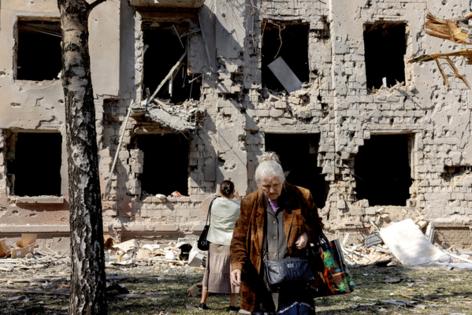Ukraine hits 2 Russian oil refineries as strikes intensify
Published in News & Features
Two Russian oil refineries were attacked on Thursday as Ukraine stepped up strikes on its enemy’s energy infrastructure.
Gazprom’s Neftekhim Salavat petrochemical facility in the Bashkortostan region was set on fire after being hit by drones, local governor Radiy Khabirov said. The site is more than 1,300 kilometers (800 miles) from territory under Ukraine’s control, making it one of Kyiv’s deepest strikes inside Russian territory.
Ukraine’s Special Operations Forces also claimed an attack on Lukoil PJSC’s major Volgograd refinery in the Volga region. Bloomberg couldn’t independently verify the claim, and Lukoil didn’t immediately respond to an emailed request for comment.
Since last month, Ukrainian military forces have intensified drone attacks on Russian energy infrastructure, including oil refineries, aiming to curb fuel supplies to the front lines. In August, at least 13 strikes were made, the largest monthly number since the start of the invasion in Ukraine. So far in September there have been at least six attacks.
Last week, drones also hit Russia’s largest Baltic oil terminal in Primorsk, and Ukraine claimed strikes on pumping stations feeding another Baltic hub, the Ust-Luga terminal.
“We’re determining the extent of the damage” at Gazprom Neftekhim Salavat, Bashkortostan’s governor Khabirov said in a statement on his Telegram channel. Local emergency services are putting out the blaze, he said. The facility is designed to have a crude-oil-processing capacity of around 200,000 barrels a day.
Ukrainian drones hit one of the primary processing units at the Salavat facility, according to a person familiar with the matter. The unit has a design capacity to process 4 million tons of condensate per year, which is equivalent to about 80,000 barrels a day, according to the website of the refinery.
Meanwhile, the Volgograd refinery — with a capacity of around 300,000 barrels a day — has halted operations after the attack, Ukraine’s Special Operations Forces said.
As a result of the repeated Ukrainian strikes, Russian refining runs have now dropped below 5 million barrels a day, the lowest since April 2022, according to estimates from JPMorgan Chase & Co. The Baltic strikes also reduced Russia’s weekly crude-export flows by more than 900,000 barrels a day, the sharpest weekly decline since July last year, according to vessel-tracking data compiled by Bloomberg.
So far, Ukraine’s allies have mostly ignored the attacks. While Washington and Brussels haven’t given public support for the strikes, they haven’t criticized either. That’s a shift from when Joe Biden was in the White House and members of his administration would reprimand Kyiv for incursions that affected Russia’s oil industry.
The Group of Seven nations are currently working on a new sanctions package against the Kremlin and are aiming to finalize a text in the next two weeks, Bloomberg reported earlier this week.
©2025 Bloomberg L.P. Visit bloomberg.com. Distributed by Tribune Content Agency, LLC.







Comments